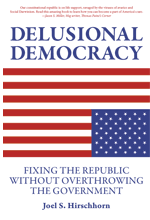 Across the political divide Americans understand our democracy has stopped working for them – unless they happen to be comfortably wealthy. Prostitutes are held in higher esteem then today’s politicians because at least they’re providing a service. Our elected leaders appear to only service themselves and their cronies as Hurricane Katrina exposed to our national shame in 2005.
Across the political divide Americans understand our democracy has stopped working for them – unless they happen to be comfortably wealthy. Prostitutes are held in higher esteem then today’s politicians because at least they’re providing a service. Our elected leaders appear to only service themselves and their cronies as Hurricane Katrina exposed to our national shame in 2005.Many progressive political activists such as myself believe the best approach is to take over the Democratic Party the same way conservatives captured the GOP. Hence the enthusiastic pride of volunteers like me who helped Democrats recapture congress in November.
Joel S. Hirschhorn, author of Delusional Democracy: Fixing The Republic Without Overthrowing The Government (Common Courage Press) disagrees. He advocates for the systematic dismantling of the two parties “duopoly” instead.
Hirschhorn’s views were shaped by his experiences as a professor at the University of Wisconsin, a congressional staffer at the Office of Technology Assessment, a business consultant and the Director of Environment, Energy and Natural Resources at the National Governors Association. Chapters 1-6 of Hirschhorn’s book are essentially a rant against the corporatist state plaguing America.
On that score he’s admittedly preaching to the choir with people like me. Bloggers such as myself eat the “our country is a corporate plutocracy” rant for breakfast, lunch and dinner. Venting about it has become our fuel and while I’ve read similar rants in many different places, I nevertheless appreciate what Hirschhorn has to say about it. His prose effectively combines earnestness with a common touch.
Chapters 7-10 are more focused on his proposed solutions to break the two party stranglehold such as compulsory voting, cleansing politics from “dirty” money, expanding ballot initiatives and giving voters the option to choose “none of the above.” Some might consider his solutions impractical and I’m not a fan of ballot initiatives or his “none of the above” approaches. However, incremental change is not likely to reverse the trend of crony capitalism undermining our democracy and Hirschhorn deserves credit for thinking boldly.
From a scholarly point of view it annoys me that Hirschhorn doesn’t footnote anything (which I ask him about). For example, in Chapter 7 Hirschhorn cites a national poll conducted in 2000 about Americans support for “public financing.” As a reader I’d like to know what “national poll” he’s referring to and where he’s getting those figures. Typically, I review endnotes upon completing a chapter to see where information like this is coming from and it bothers me when I don’t have that option. Was it a newspaper article? Thankfully, Hirschhorn does provide a bibliography of secondary sources at the end of his book.
I definitely share Hirschhorn’s passion about the state of our democracy but remain inclined to try and change the Democratic Party instead of getting behind a third party at this time. From my vantage point we’re more likely to achieve real change that way. Nevertheless, Hirschhorn wrote a thoughtful book and he agreed to a healthy give and take in a podcast interview. Please refer to the media player below.
This interview can also be accessed for free via the Itunes Store by searching for "Intrepid Liberal Journal."
3 comments:
Yes! More and better ballot initiatives! The U of Colo. Law School presents a conference on ballot initiatives and how to improve them on Jan 26 at the Colorado Capitol.
Information and registration at: http://www.colorado.edu/law/centers/byronwhite/current.htm
The Economist Magazine has been saying for decades "letting the people themselves take the decisions is the logical next step for the West." Indeed Western history since the Magna Carta can be seen as a path to more democracy: "Government by the People."
More on initiatives and advances at: Vote.org
Your prostitutes and politicians comment wins the don't sugarcoat it award. Should go up today. Thanks.
Now with my fixed wireless connection, I can listen to your podcasts.
Good inverview. I suppose that if he got his way, our system of Democracy would be much better off.
I wonder, though, not having read the book, how he thinks any of this is going to occur? He says in his podcast that he likes to provide actual solutions, but what I didn't hear discussed was how they should be implemented. I would hardly call that offering "solutions".
If we rinsed the carbon dioxide out of the atmosphere, we could stop global warming. OK, but how, by whom, at whose cost?
Likewise, the only individuals who can implement any of his solutions also the ones who have the most to lose by doing so! If they are as corrupt as he says they are (and I think they are) why on earth would they want to change that system against their own interests?
Is this discussed in his book, or is it all pie in the sky?
Post a Comment